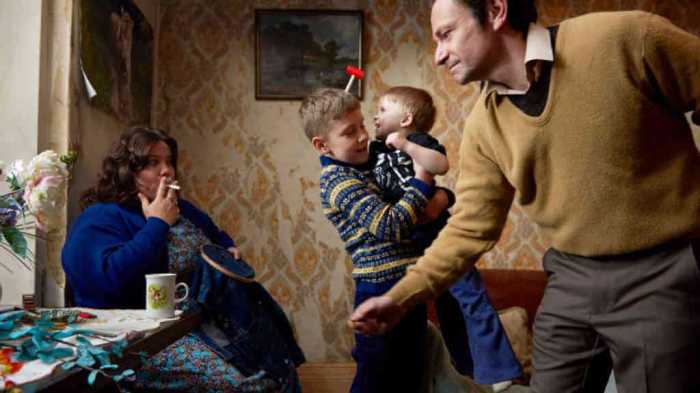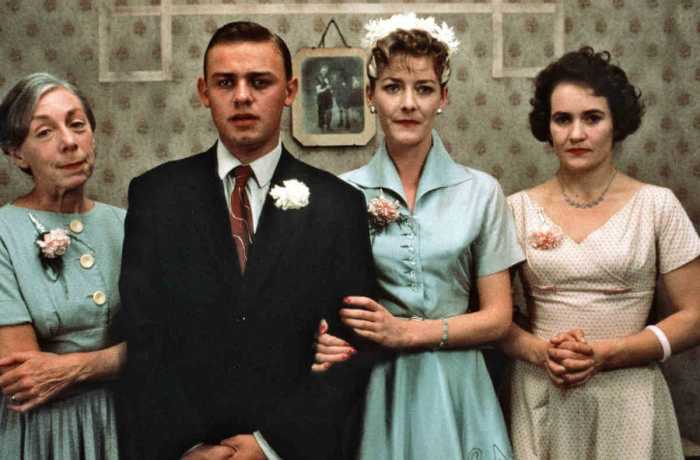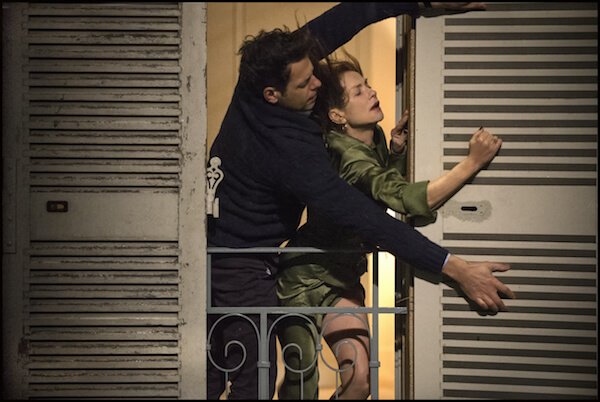BY GARY M. KRAMER | Gay filmmaker Terence Davies’ latest film, “Sunset Song,” is a handsomely mounted period epic. Based on the novel by Lewis Grassic Gibbon, the film is a coming of age tale set in rural Scotland in the early 1900s. Chris (Agyness Deyn), a schoolgirl, lives a hardscrabble life. Her father, John (Peter Mullan), is stern, mistreating his wife and six kids. Chris finds some measure of happiness over the years when she meets and falls in love with the handsome Ewan (Kevin Guthrie). But the war intrudes, and Ewan must enlist. As Chris faces additional challenges, she also finds strength, and that makes for a powerful, uplifting drama.
On the phone from London, Davies talked about why he chose to film Gibbon’s novel, which is not well known in the US, explaining that he saw a 1971 version of “Sunset Song” on BBC television.
“I’d never heard of it, but I wanted to read it,” he said. “It’s difficult to read, but the story was wonderful. I never thought I’d get a chance to make it. It took 18 years to get to the screen.”
Terence Davies explains how he mined characters’ interior lives in adapting Lewis Grassic Gibbon novel
The film opens when Chris is 14 and covers seven years of her life as she becomes more mature and more self-reliant, a theme Davies has addressed in many of his films, such as “The Long Day Closes” and “The Neon Bible.” The filmmaker did not grow up on a farm, but said that he identified with Chris because of other aspects of his upbringing.
“My father was very violent,” Davies said. “My family had such an awful time with my father. I was happy once he actually died. Such extremes will always be in me. I’m ecstatically happy and very low. Those swings are part of me — and what I write and how I shape it. Out of the blue you can hear someone has cancer, and it influences your whole day in an instant. Or you can discover a wonderful new poem.”
He continued, “I was, as a child, aware of intense happiness. The moment of ecstasy became the most important thing at that particular time. I went to the movies a lot. Those images stayed with me and helped create that moment of ecstasy. I can recall what I saw, where I saw it, the route I took, and where I sat. I thought everyone responded that way.”
Davies further explained that like movies, music was an essential force in informing his life and work. His 1988 film “Distant Voices, Still Lives” shows the power of music and how it touches people’s lives. There are ballads sung throughout “Sunset Song” with strong emotional meaning for the characters.
“Music is so powerful,” Davies effused. “You respond viscerally to it. I think cinema at its best can be like music, should be like music. You go from wonderfully romantic to not so wonderfully romantic. You go on an emotional journey. You listen and respond to it.”
Digressing for a moment to describe the Great American Songbook as “poetry for ordinary people,” Davies praised queer composers Cole Porter and Stephen Sondheim, calling the latter, “the last great exponent of that wonderful tradition. It ends when Sondheim dies.” Citing Hoagy Carmichael’s “I Get Along Without You Very Well” as a prime example, he said that songs “tell you a lot about humanity, the way people talk about love and loss…. The songs were telling people about bad things in the most accessible way.”
While memory and music are core parts of Davies’ approach to creating emotional resonance in “Sunset Song,” he also focused on establishing what he calls the “internal subtextual meaning” of scenes. The drama unfolds episodically, with sometimes days, months, or even years passing between scenes. In depicting seven years in 135 minutes, the filmmaker explained, he aimed to capture “the essence” of the book without being “absolutely slavish. It’s trying to find what is the story, not what people do, but what is psychologically going on.”
The characters in “Sunset Song” are complex, and their lives are difficult. Summing up Chris, Davies said she is charming, witty, and has enormous strength. Despite her many hardships, she is no “long suffering” heroine, he said, mindful of how feminists might be unhappy with what could seem like a stereotypical female character.
“My mother was gentle, but she was enormously tough without ever being hard,” he said.
Davies said that growing up in the 1950s, he was sensitive to cues in Douglas Sirk films like “Magnificent Obsession” and “All that Heaven Allows” that featured women front and center.
“The main characters in those films influenced me emotionally,” Davies said. “There were rigid ways of behaving. That was true as much for men as it was women,” and he pointed to the experience of Ewan, a conscientious objector who feels compelled to join the military to avoid being conscripted, as an example of how people’s lives were constrained.
“Sunset Song” might sound melodramatic, but it’s to Davies’ credit as a filmmaker that he never leans toward sentimentality. On that point, he observed, “I don’t like sentimentality. I find it embarrassing. It’s seductive. But as James Joyce calls it, it is ‘unearned emotion.’ It has to be true and felt. The scene where Chris holds Ewan’s clothes is not in the book, but it is deeply felt. The love she has is so deep. It’s easy to be sentimental. In most modern drama, people cry all the time. I am very strict about that. I think it’s cheap.”
SUNSET SONG | Directed by Terence Davies | Magnolia Pictures | Opens May 13 | Film Forum, 209 W. Houston St. | filmforum.org | Lincoln Plaza Cinema, 1886 Broadway at W. 62nd St. | lincolnplazacinema.com




































